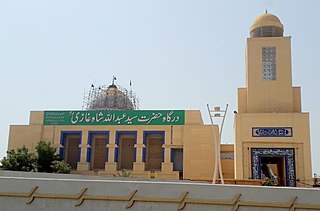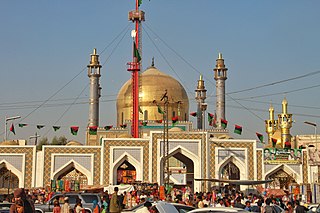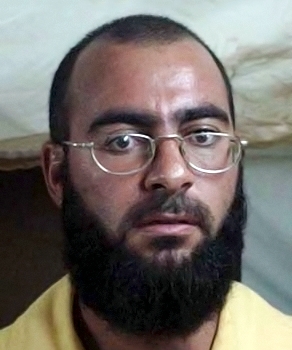
Elijah Muhammad was an American religious leader, black separatist, and self-proclaimed Messenger of Allah who led the Nation of Islam (NOI) from 1933 until his death in 1975. Muhammad was also the teacher and mentor of Malcolm X, Louis Farrakhan, Muhammad Ali, and his son, Warith Deen Mohammed.
Abu'l-Barakāt Hibat Allah ibn Malkā al-Baghdādī was an Islamic philosopher, physician and physicist of Jewish descent from Baghdad, Iraq. Abu'l-Barakāt, an older contemporary of Maimonides, was originally known by his Hebrew birth name Baruch ben Malka and was given the name of Nathanel by his pupil Isaac ben Ezra before his conversion from Judaism to Islam later in his life.

Junayd of Baghdad was a Persian mystic and one of the most famous of the early Islamic saints. He is a central figure in the spiritual lineage of many Sufi orders.
Abū Bakr Aḥmad ibn ʿAlī ibn Thābit ibn Aḥmad ibn Māhdī al-Shāfiʿī, commonly known as al-Khaṭīb al-Baghdādī or "the lecturer from Baghdad", was a Sunni Muslim scholar known for being one of the foremost leading hadith scholars and historians at his time. He is widely considered an important authority in hadith, fiqh and history.

Abdul Qadir Gilani was a Hanbali scholar, preacher, and Sufi leader who was the eponym of the Qadiriyya, one of the oldest Sufi orders.

Abdullah Shah Ghazi also known as Abdullah al-Ashtar was a Muslim mystic and Sufi whose shrine is located in Clifton in Karachi, in Sindh province of Pakistan.

Usman Marwandi, popularly known as Lal Shahbaz Qalandar, was a Sufi saint and poet who is revered in South Asia.
Sindhi literature is the collection of oral and written literature in the Sindhi language in prose and poetry. The Sindhi language of the province of Sindh in Pakistan is considered one of the oldest languages of ancient India, and influenced the language of Indus Valley inhabitants. Sindhi literature has developed over a thousand years.

Khawajah Syed Qutbuddin Maudood Chishti was an early day Sufi Saint, a successor to his father and master Abu Yusuf Bin Saamaan, twelfth link in the Sufi silsilah of Chishti Order, and the Master of Shareef Zandani. He was born around 430 Hijri in the city of Chisht. He initially received education from his father. He memorized the Qur'an by age 7 and completed his education when he was 16. His work includes two books, Minhaaj ul Arifeen and Khulaasat ul Shariah. He died in the month of Rajab at the age of 97 in 533 AH. He was buried at Chisht like many of the early Chishtiyya.

Mir Sayyid Ali Hamadani was a Sufi Muslim saint of the Kubrawiya order, who played an important role in spread of Islam in Kashmir. He was born in Hamadan, Iran and preached Islam in Central Asia and Kashmir. He died in Swat on his way from Srinagar to Mecca and was buried in Khatlan, Tajikistan in 1385 CE, aged 71–72. Hamadani was also addressed honorifically throughout his life as the Shāh-e-Hamadān, Amīr-i Kabīr, and Ali Sani.
Mufti Jafar Hussain was an Indian, then Pakistani, Shia Islamic scholar.
Hajib Shakarbar was born as the younger of the two sons of Shams Tabrizi and Shams Sabzwari in 1213 AC. His grand parents named him Alauddin Muhammad, but when his father returned from Tabriz to see his newborn baby, he changed the name from Alauddin Muhammad to Syed Ahmad because he had a dream to this effect in Tabriz. The new baby showed the signs of a born Hafiz and so came to be known as Zinda Pir from his very infancy. He got the title of Shakarbar in Sabzwar and of Hajib in Makkah, and became so famous with the sweet combination of Hajib Shakarbar that his original names went into total oblivion. He joined his father in Multan, Pakistan, with his elder brother Naseeruddin, and a large armed escort of Turkish, Iraqi and Kabul fighters in 1289 AC.

Shah Inayatullah, popularly known as Sufi Shah Inayat Shaheed, Shah Shaheed or Shah Inayat of Jhok, was a 17th-century Sindhi Sufi saint and revolutionary from Jhok. He was the first socialist and agricultural reformist of Sindh.

Ibrahim Awad Ibrahim Ali al-Badri, commonly known by his nom de guerreAbu Bakr al-Baghdadi, was an Iraqi militant who was the first caliph of the Islamic State (IS) from 2014 until his death in 2019.
Sufism in Sindh covers the tradition of Sufism in Sindh, which is reputed to be an area of mystics. Sindh is famous for the enormous number of saints and mystics who lived there and preached peace and brotherhood. According to popular legend, 125,000 of them are buried on Makli Hill near Thatta. There is an abundance of Sufi literature produced in Sindh throughout history.

ʿAbd al-Razzāq b. ʿAbd al-Qādir al-Jīlānī, also known as Abū Bakr al-Jīlī or ʿAbd al-Razzāq al-Jīlānī for short, or reverentially as Shaykh ʿAbd al-Razzāq al-Jīlānī by Sunni Muslims, was a Persian Sunni Muslim Hanbali theologian, jurist, traditionalist and Sufi mystic based in Baghdad. He received his initial training in the traditional Islamic sciences from his father, Abdul-Qadir Gilani, the founder of the Qadiriyya order of Sunni mysticism, prior to setting out "on his own to attend the lectures of other prominent Hanbali scholars" in his region. He is sometimes given the Arabic honorary epithet Tāj al-Dīn in Sunni tradition, due to his reputation as a mystic of the Hanbali school.
Robert "Musa" Cerantonio is a former ISIS propagandist who has been called perhaps "the most famous jihadist in Australia". Cerantonio converted to Islam in 2002, he became an Islamic preacher a few years later, then a supporter of the restoration of the caliphate, and of the Islamic State. He has been arrested and deported once, and is currently serving a prison sentence for trying to travel by boat from Australia to ISIS territory in the southern Philippines due for release in May 2023.

Khwaja Sayyad Abdullah Chishti was a 16th century Sufi Saint of Chishti order and a direct descendant of Khwajah Maudood Chishti.
Shah Mohammed Farid-ud-Din Baghdadi, also known by the honorary title Shah Sahib, sometimes spelled as Fareed-ud-Din, was the seventeenth century's Iraqi Sufi saint. He is believed to have propagated Islam in the Chenab Valley of Jammu and Kashmir. He left for Hejaz and offered the Hajj at Mecca, and subsequently travelled through Egypt and Sindh. Prior to his propagation of Islam in the valley, he travelled through Agra and then reached Kishtwar where he spread Islam around 1075 Hijri, corresponding to 1664 AD. He was 75 at that time.

Pir Hadi Hassan Bux Shah Jilani, commonly known by the title Hadi, was a Sufi saint and poet from Sanghar in modern-day Pakistan who belonged to Qadiriyya Sufi order. He was born at Dargah Bhuro Bhawan Shah Jilani near Hyderabad, Sindh and lived most of his life in Duthro Sharif Sanghar Sindh after traveling through Sindh to spread Islam and Sufism. He wrote his poetry in many languages, mostly in Sindhi but also in Urdu, Persian and other languages. The annual Urs of Hadi take place in the month of Jumada al-Awwal in Duthro Sharif Sanghar.














